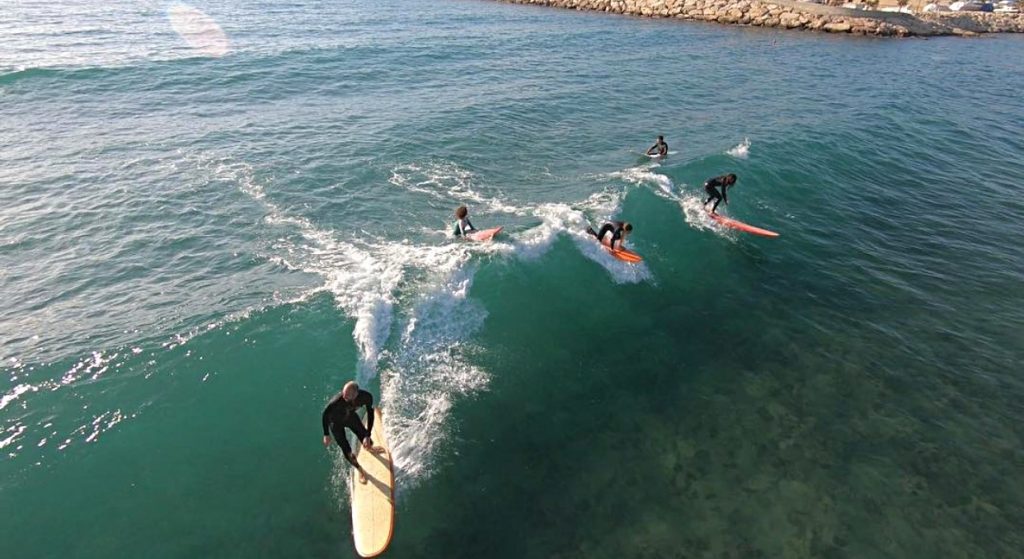
- ARAB NEWS
- 13 Jul 2025

Carla Chahrour
DUBAI: More than 11,000 athletes from around the world will compete in the upcoming Olympic Games in Tokyo. All of them have the same dream – to win a gold medal. However, not all dreams are equal.
In 2019, the attention of the world’s athletes was riveted towards Lebanon, the small country of 10,456 square kilometers and a population of less than 10 million, during its attempt to qualify for a position at surfing’s long-awaited Olympics debut in Japan through competing at the ISA (International Surfing Association) World Surfing Games in Miyazaki.
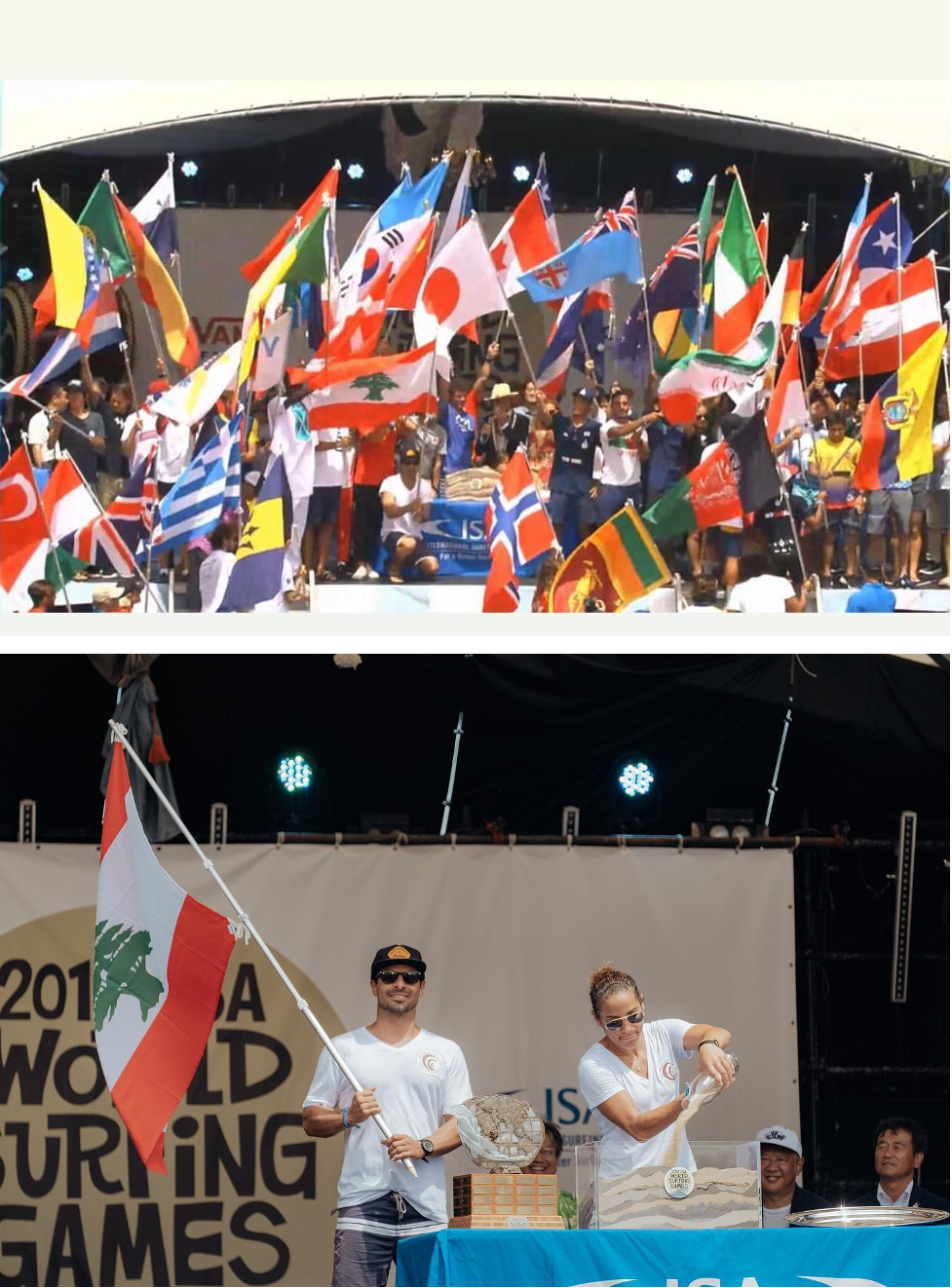 The Lebanese Surfing Federation at the 2019 ISA World Surfing Games in Miyazaki. (Lebanese Surfing Federation)
The Lebanese Surfing Federation at the 2019 ISA World Surfing Games in Miyazaki. (Lebanese Surfing Federation)Despite the failure to qualify for Tokyo 2020, this accessibility to international recognition brought about by their participation served as a milestone to the Lebanese Surfing Federation which, unlike many of the teams competing in such competitions, is completely privately funded and receives no support for their programmes due to the derisory budget allocated to elite sport in the country and the subsequent absence of strategies that could lead athletes to success.
In an exclusive interview with Arab News Japan, the founders of the Lebanese Surfing Federation, Ali El-Amine and Rania Halabi discuss how they were able to create a peaceful haven through sports in their all-too-often war-torn country, the inspiration behind the initiation of a national team and the difficulties associated with maintaining it albeit the limited involvement of the Lebanese Government in sport.
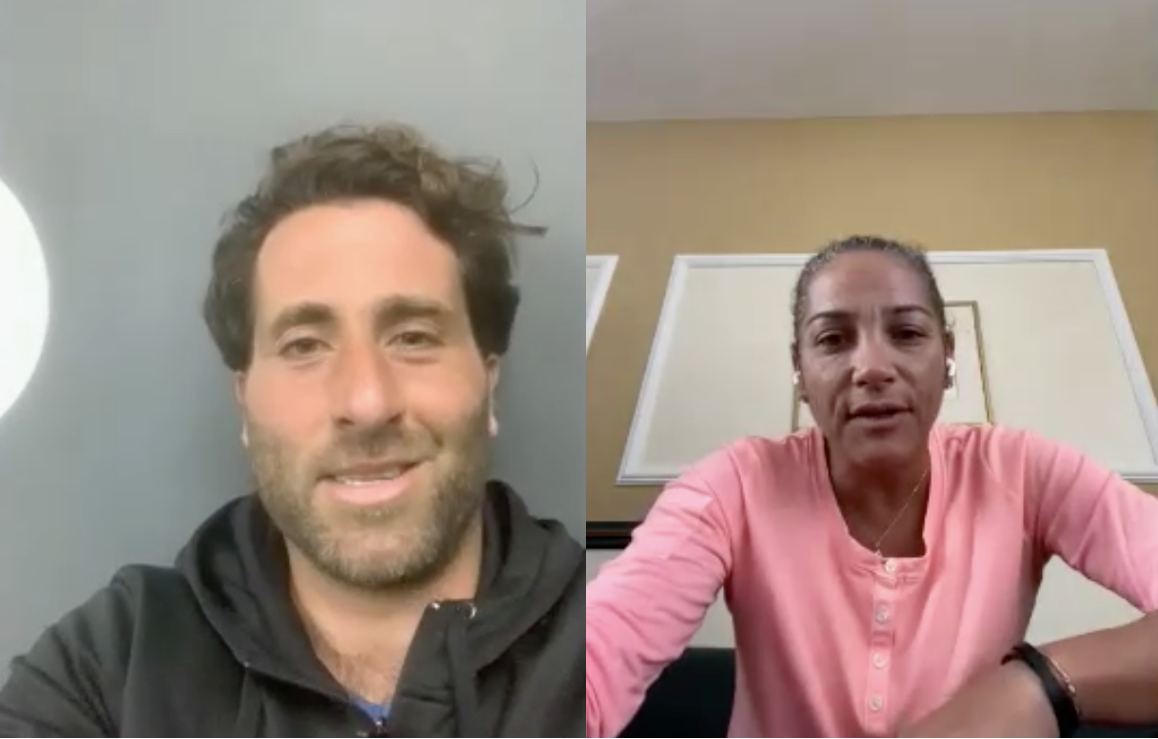 The founders of the Lebanese Surfing Federation, Ali El-Amine (L) and Rania Halabi (R). (ANJP/Screen grab)
The founders of the Lebanese Surfing Federation, Ali El-Amine (L) and Rania Halabi (R). (ANJP/Screen grab)“I started Surf Lebanon in 2012 and from that we came up and started pushing the sport in the country and we got the association on track in 2015. We’ve been working on trying to develop the sport in the country, but as we can see, it’s quite difficult. We had a proper crack at it by trying to qualify for the Olympics qualification in 2019 but we came up short on that. Then the whole economic situation in Lebanon and COVID-19 happened, which set us back,” El-Amine said.
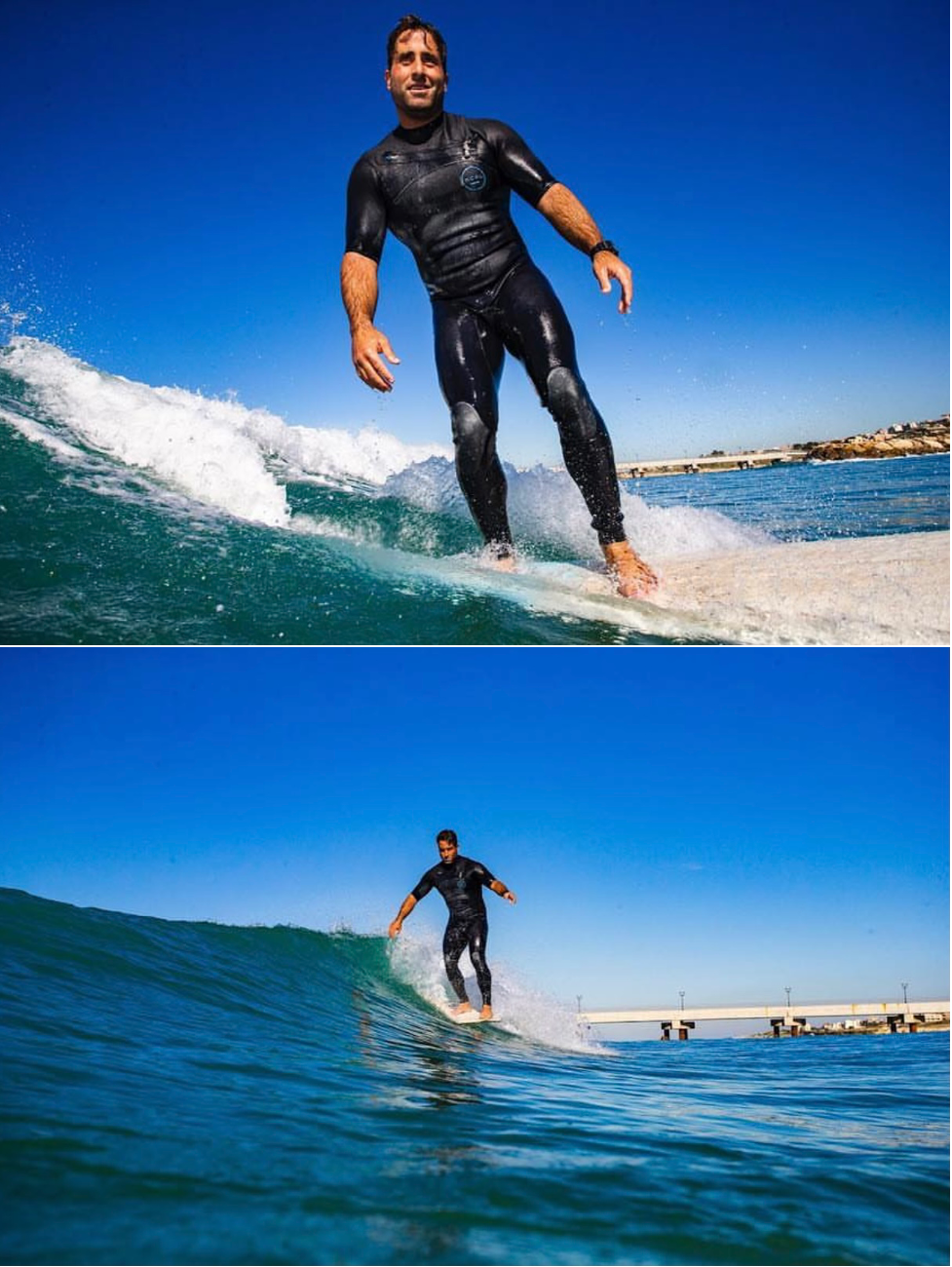 Co-founder of the Lebanese Surfing Federation Ali El Amine surfing in Lebanon. (Surf Lebanon)
Co-founder of the Lebanese Surfing Federation Ali El Amine surfing in Lebanon. (Surf Lebanon)Born and raised in Huntington, California, USA, the force behind the surfing movement entered the Lebanese sport sector in 2012, where he decided to partner with Halabi, a business entrepreneur and extreme-sport enthusiast, to bring their passion for surfing into their home country to enhance the availability of the sport through enabling people to interact with their coastline while simultaneously promoting a “peaceful climate” within the sport institution and exhibiting the country’s potential as an all-year-round destination for surf.
This is done through hosting ocean-awareness workshops that teach aspiring young surfers about ocean safety, surf techniques and practical skills, the provision of surfing equipment to those interested in learning supplemented by Surf Lebanon, El Amine’s surfing club and training school, as well as aiding athlete’s training and enabling their representation in international competitions under the federation.
“Initially when we started the federation, we wanted to spread it from North to South. Lebanon is on a coast so it’s very accessible to get to the water in Lebanon. We thought that by doing the federation, we could give a green pass to all the surfers to use the beach. So by it becoming a sport for the country, it allows surfers to access the beach more regularly versus having to pay for certain hotels or locations because waves are right in front of a privatized establishment,” El-Amine said.
“So by us doing the federation we figured that we’d get that eliminated internally. Externally, it would allow us to showcase that we do get waves. Lebanon is not just a party, snowboarding, hummus festival-type of place. You can get surfers from around the world in. Because when surfers travel they don’t just travel for the waves, they travel for the culture, for the food, and we have all that.”
“The people in Lebanon are some of the coolest humans in the world and they’re super nice and we do have good food as well as good waves. While we don’t have world-class waves like in Indonesia or Australia, on a good day, we could be one of the best places on the planet.”
“The other thing was also to push the sport into the younger communities to where they steer away from the political-religious background following them,” El-Amine added.
Halabi also elaborated on the federation’s wider mission of placing Lebanon on the international map of sports through hosting surfing events such as the World Surf League’s Qualifying Series, in order to attract surfers from around the world and draw attention to the country.
“In the future, we wanted to see if we could put Lebanon on the map and be able to host surfing competitions here, as well as attract international surfing competitions to include it as a destination within their tours,” Halabi said.
According to El Amine, there is currently only one Qualifying Series (QS) event in the Middle East that takes place in Tel Aviv. Thus, with the onset of surfers from Arab nations such as Oman, United Arab Emirates, Morocco and Iran, the federation aspired to develop the sport in the country to enable it to become considered as a second spot within the Middle East.
Armed with an unwavering desire to showcase their country’s potential, the federation’s co-founders have stubbornly latched onto the hope that a peaceful community is attainable. Yet, despite their noble intentions, the process of organizing such an event has proved to be an increasingly daunting task when faced with the stark reality of their country.
Lebanon has thrusted into its worst economic crisis in decades. This has been exacerbated by the coronavirus COVID-19 pandemic, compounded by the political unrest and the explosion that struck Beirut on August 4, killing nearly 178, injuring more than 6,000, leaving hundreds of thousands of people homeless, and destroying half the city.
“It is important to understand that everything was self funded by me or by Ali and we don’t have support from the government. It is not something that they would understand to push for or understand what it would mean to be the first Arab country with a World Surf League QS qualification – they just don’t have that culture of sports present within them,” Halabi.
With Lebanon’s currency collapsing, the prices for basic goods skyrocketing and the threat of hunger looming for its poorest people, the possibility of attaining a government grant or having the government re-assess the opportunity cost of capital public investment in such sports projects has slipped even further.
Thus, with the inexistence of public support, the federation is left with no choice but to continue to rely on their limited personal finances to fund the operational costs, which has slowed down the development of the sector.
“The situation has affected the whole surfing scene. The COVID-19 lockdowns, the roadblocks from the demonstrations and the whole economic state where a lot of people lost their jobs, a lot of people don’t have income. Surfing is a luxury sport, it’s not like a mandatory sport in your life so I think it affected everything, let alone surfing. People here are just trying to make ends meet, they’re not going to be worrying about surfing at the moment. That’s the last thing on their list,” El Amine said.
The co-founders struggled to attain supportive funds even prior to the upheaval in Lebanon, describing their requests for support from the ministry as having “fallen on deaf ears” and their requests to large corporations as unsuccessful due to the lack of familiarity with the surfing culture.
For example, when competing at the ISA World Surfing Games in Miyazaki, the federation was only capable of funding one athlete, whereas other nations brought in three. This put them at a disadvantage as they were forced on relying on the skills of a single surfer.
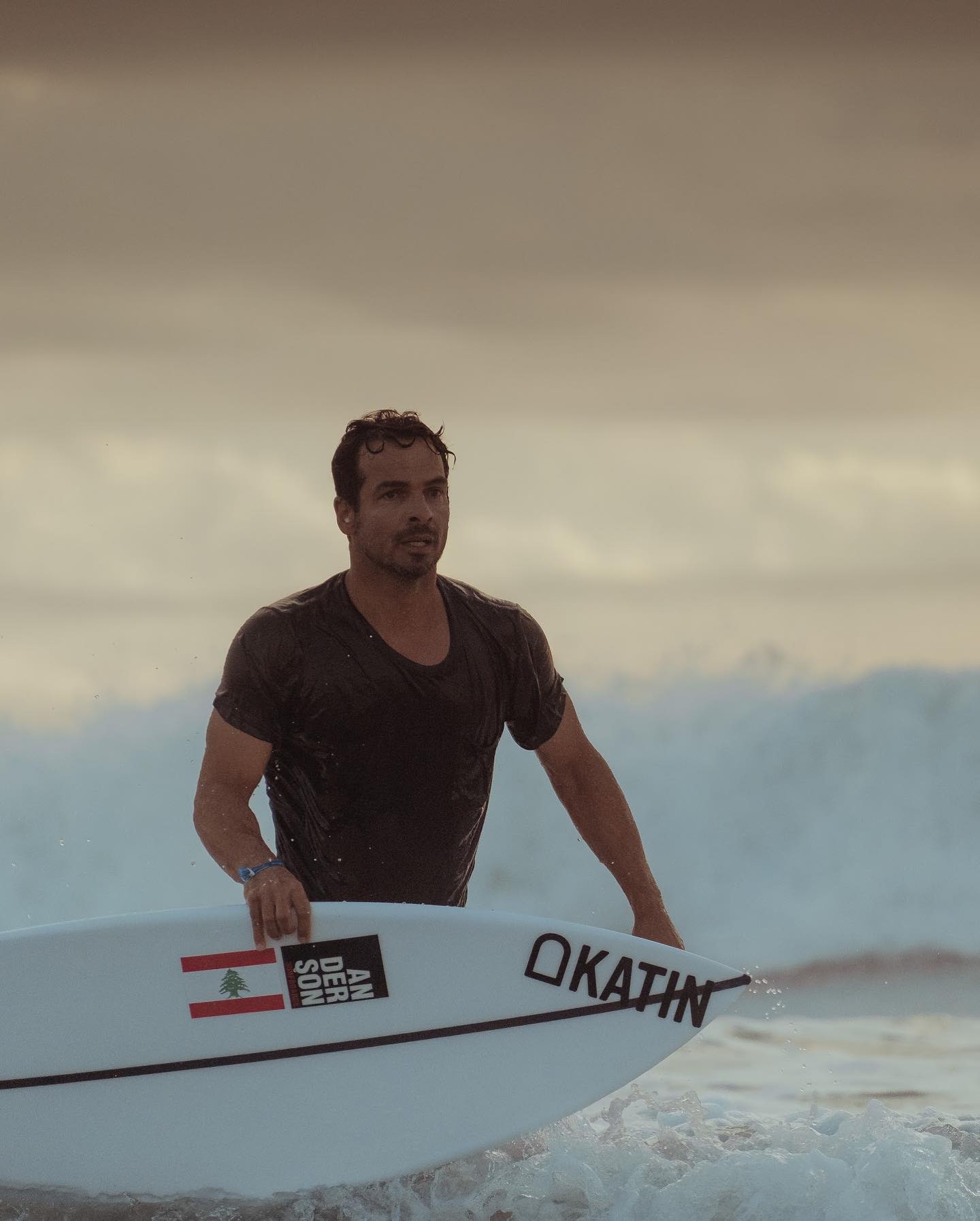 Yves Bright, a Lebanese-born professional surfer that represented Lebanon during the 2019 ISA World Surfing Games at Kisakihama Beach in Miyazaki, Japan. (Lebanese Surfing Federation)
Yves Bright, a Lebanese-born professional surfer that represented Lebanon during the 2019 ISA World Surfing Games at Kisakihama Beach in Miyazaki, Japan. (Lebanese Surfing Federation)Yves Bright, a Lebanese-born professional surfer that was raised California, USA, was the athlete selected to represent Lebanon during the competition due to his background in QS contests.
Stressing on the accomplishments of Bright, the co-founders praised his performance during the competition that single-handedly allowed Lebanon to make a statement showcasing their people’s potential by advancing through several rounds.
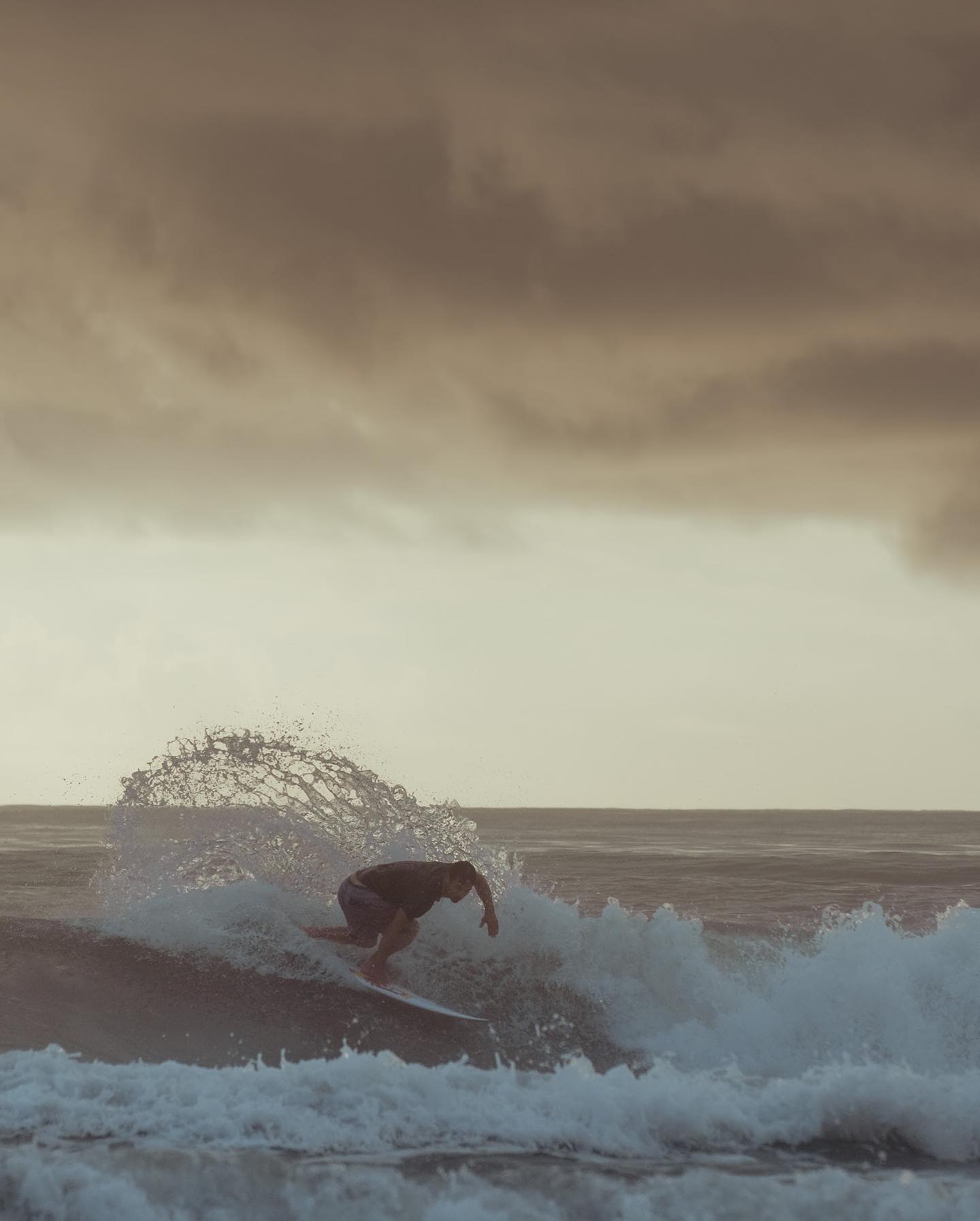 Yves Bright, a Lebanese-born professional surfer that represented Lebanon during the 2019 ISA World Surfing Games at Kisakihama Beach in Miyazaki, Japan. (Lebanese Surfing Federation)
Yves Bright, a Lebanese-born professional surfer that represented Lebanon during the 2019 ISA World Surfing Games at Kisakihama Beach in Miyazaki, Japan. (Lebanese Surfing Federation)”Yves Bright was our best athlete during the competition. We wanted to get someone who can actually make it. Having Eve on the team allowed us to make it through several heats – we didn’t just show up and lose. Although we only had one surfer, we did better than countries like Srilanka,” El Amine said.
“Usually at the qualifications you’re allowed to have three surfers, but we didn’t have the funding to actually fund three surfers and so we chose him because we didn’t want to be bottomed down and even with that one surfer we were able to come in sixth in Asia, which was pretty good,” Halabi added.
Providing Morocco as an example that demonstrates the important role played by sports in the growth and appeal of a country, as well as the significant bearing it has on tourism, El Amine mentioned that Morocco’s Ramzi Boukhiam had qualified for the Olympic Games. El Amine added that “Morocco has had the surf culture for the last 25 years. They are government funded, they support everything that has to do with surfing. Their income from tourism comes from surfing rather than any other thing you can think of.”
Today, the co-founders quest to promote the culture of surfing within Lebanon, which has steadily increased since the inception of the federation to about 200 people nationwide, continues. But they have no illusions about how long that path will take to be accomplished as their aspirations are increasingly being put to the test by a dysfunctional system.
To many people throughout the world, the name Lebanon now suggests sectarianism, war and violence. Nevertheless, the country’s tight-knit surfing community portray a different narrative. One where the country’s vibrancy is re-awakened and not ubiquitously dominated by religion, politics or socioeconomic status.
“Everyone is treated equally when they’re in the water,” El Amine said.